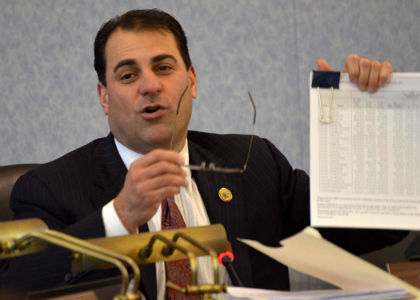
By Senator Paul Sarlo
Gov. Chris Christie talks about transparency, but when it comes to his fiscal 2015 budget, the governor has decided to close the shades on the public. As a result, the Senate Budget and Appropriations Committee is too often left to make critical decisions that affect all New Jerseyans without the necessary information.
As we resume budget hearings Tuesday, I hope the administration embraces the public’s right to know how its money is spent.
I recently asked the Treasury Department for the administration’s projections for online gambling revenue for the current and next fiscal year. The request stems from the administration’s overstated estimates for the current fiscal year of $160 million. With four months left in the fiscal year, the tax has generated just $6 million.
The Treasury Department has refused our request, initially saying it was “too complicated” to untangle online revenue from traditional casino floor revenue, even though the state already discloses monthly online gambling revenue. Later, state Treasurer Andrew Sidamon-Eristoff said he doesn’t see any value in decoupling the revenues and prefers to look at the issue “holistically.” I couldn’t disagree more.
From a budget perspective, we need to know the reliability of revenue estimates.
From a policy perspective, it’s important to know the benefits of the program as we assess the risks and rewards of expanding gambling.
There is other important financial information residents deserve to have from the state. But the administration has been less than forthcoming.
As chairman of the budget committee, I have not permitted questions about the controversial GeorgeWashingtonBridge lane closings unless those questions involve how public money is spent. Even on that topic, we can’t get answers.
The Christie administration hired the Gibson, Dunn & Crutcher law firm in January to conduct an internal review of the lane closings. News reports indicate the work will cost taxpayers at least $1 million, likely more. We asked for the legal costs, but were told that no bills have been submitted.
It should be pointed out that the joint legislative committee investigating the closings has released its legal costs. The public deserves to know the price tag so it can determine whether the public benefit outweighs the public cost.
The administration has been equally evasive when it comes to school aid and its adherence to a bipartisan school funding formula blessed by the state’s Supreme Court in 2008.
ActingState Education Commissioner David Hespe came before the budget committee and could not answer how much it would take to fully fund the formula. The answer, according to the nonpartisan Office of Legislative Services, is $1.6 billion.
The administration has also repeatedly refused to provide the committee the amount of funding school districts would see in the upcoming budget if it simply ran the funding formula at current spending levels instead of using a more arbitrary method. As a result, the public has no understanding of how the discretionary method departs from the formula.
In another example, Higher Education Secretary Rochelle Hendricks has told our committee that the administration used a detailed scoring system to award roughly $750 million in voter-approved financing for capital projects at the state’s colleges. But she has blocked our efforts to see the scoring sheets.
The public has a right to know how the administration picked winners and losers.
The state has projected up to $300 million in savings from Medicaid reform, but we are seeing spending increases. Health and Human Services Commissioner Jennifer Velez could not tell our committee how much we saved thus far. That’s troubling.
The answers to these questions have taken on added meaning after Standard & Poor’s downgraded the state’s credit rating, which increases the state’s borrowing costs.
In explaining the downgrade, the agency said the administration has overestimated its revenue projections and resorted to one-time gimmicks, such as delaying property tax credits, to close the budget gap.
It’s time for the administration to let some sunshine into its budget process. The public deserves better.
Read Senator Sarlo’s editorial from the Star-Ledger here.

